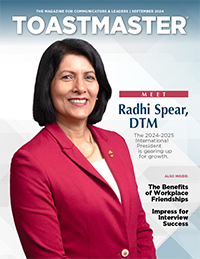
Click play to hear Bill Brown's pronunciation tips.
One of our objectives in speaking is to connect with our audience members. When we make that connection, they are more apt to listen to what we say and accept our message. You have probably heard many techniques to make that happen. Eye contact is a popular one. There is one method, however, that I rarely hear discussed, and that is pronunciation.
Pronunciation is one of those techniques that works best when the listener isn’t aware of it. If they don’t notice how you say your words, you are doing something right, which means you are not creating a distraction.
How do you feel when someone sings off-key? Personally, I find it hard to enjoy the music. Mispronunciation is like singing off-key. I learned what was perhaps my most valuable pronunciation lesson back at my university radio station. The station offered a short, informal class for those interested in broadcasting. One topic was the correct pronunciation of words and terms we would use on the air. My most valuable lesson? How to pronounce the definite and indefinite articles in English.
For those of us without a strong background in English grammar, the definite article is the word “the.” The indefinite articles are the words “a” and “an.” My radio station, WBAA, in Lafayette, Indiana, taught us a pronunciation guide based on normal, everyday usage.
“The” has two pronunciations, a schwa (ə) and a long “e.” For the sake of clarity, I will spell them “thə” (pronounced like the “a” in about) and “thee” (pronounced like the “e” in need). It is quite common for people who are speaking formally, such as speakers and television reporters, to think that using “thee” is best in most instances. After all, it sounds formal and official—at least to them. But what I learned in class is quite different. They taught us the way people normally talk—the way we, as speakers, want to talk. The rules are:
If the word following the definite article is followed by a consonant, then say “thə.” If it is followed by a vowel sound, use “thee.” Hence, it is “thə” table, “thə” wall and “thee” elevator. The indefinite article is similar. If the following word begins with a consonant, pronounce it “uh.” (“We went to a store.”) If the following word begins with a vowel sound, use the word “an.” (“We saw an elephant.”)
“Mispronunciation is like singing off-key.”
You might be thinking, so now I have to think about the word that is coming up after the word that I am currently saying? No, not at all. Remember, the rule reflects normal usage. We don’t think about consonants and vowels when talking with friends. If we’re speaking in our native language, we just think about what we want to say, and then we say it.
Know Their Names
A second way to watch our pronunciation is when saying the names of people and places. We like hearing our name, and our hometown’s name, pronounced correctly. Years ago, we didn’t have a big problem with people’s names. Here in the United States, everyone had names like Bill, Bob, John, Mary and Jane. There wasn’t a lot of variety. Today, we have many people from other cultures, especially in our Toastmasters clubs.
Recently, Venkata joined my club. Our local pronunciation pattern would normally place the emphasis on the second syllable. VenKAta. When he first joined, that is how many members pronounced it. Others just mumbled it. I talked to him before one meeting, and he introduced himself as VENkata. During the meeting, I asked him how we should pronounce it. Now he hears his name said correctly, and the other members aren’t confused by it.
Besides emphasis, the sounds themselves are important. I live in Nevada. Many people from out of town pronounce it incorrectly. (The first “a” should be pronounced as in the word “flat.”) While it may not be a big deal, believe me, we notice it when people get it right—and especially when they get it wrong. Residents of Oregon feel the same way about their state’s name. (Hint: The last syllable is not pronounced “gone.”) If you aren’t absolutely sure of a pronunciation, ask. People will appreciate it.
One key way to connect with people individually or as a group is to be attentive to what they expect to hear. When we use proper, everyday pronunciation, listeners are more apt to pay attention to what we are saying and have a favorable impression of us and, hopefully, of our message.
To hear Bill Brown's pronunciation tips in audio format, scroll to the top of the article and click the play button under the toolbox icon.
Bill Brown, DTM is a speech delivery coach in Gillette, Wyoming. He is a member of Energy Capital Toastmasters in Gillette. Learn more at billbrownspeechcoach.com.


 Previous
Previous
 Previous Article
Previous Article